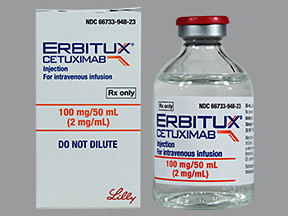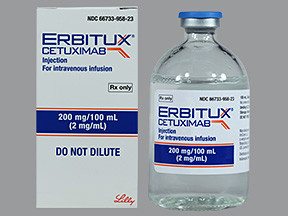CETUXIMAB - INJECTION
PHONETIC PRONUNCIATION: (se-TUX-i-mab)
COMMON BRAND NAME(S): Erbitux
GENERIC NAME(S): cetuximab
Uses
USES: Cetuximab is used to treat a certain type of cancer of the colon (large intestine) or rectum that has spread to other parts of the body. This medication is also used to treat head and neck cancer. Cetuximab works by slowing or stopping the growth of cancer cells. It binds to a certain protein (epidermal growth factor receptor-EGFR) in some tumors. Cetuximab is a man-made protein (monoclonal antibody).
How to use CETUXIMAB - INJECTION
HOW TO USE: Cetuximab is given by injection into a vein usually once a week by a healthcare professional. Another drug (e.g., diphenhydramine) may be given before you receive cetuximab to lessen the chance of certain side effects. The first dose (loading dose) is larger and is given over 2 hours. All other doses (maintenance doses) are smaller and are given over 1 hour if tolerated. The dosage is based on your medical condition, body size, and response to treatment. A healthcare professional should watch you for at least 1 hour after your infusion is finished to make sure you do not have an infusion reaction. (See Warning section). If you experience a severe infusion reaction, your infusion will be stopped and your doctor may decide to stop further treatments.
Side Effects
Precautions
Interactions
Overdose
Images
Reviews
Faq for CETUXIMAB - INJECTION
Cetuximab is used to treat certain types of cancer, including colorectal cancer and head and neck cancer.
Cetuximab works by targeting a specific protein on cancer cells, limiting their growth and spread.
Cetuximab is given as an intravenous (IV) infusion at a medical facility by a healthcare professional.
Some common side effects of cetuximab include acne-like rash, nausea, diarrhea, and fatigue. Other less common but serious side effects may occur.
The length of a cetuximab infusion can vary, but it typically takes about 1-2 hours.
Cetuximab can cause severe infusion reactions, allergic reactions, and heart problems. It may also decrease the effectiveness of vaccines.
Cetuximab is not recommended during pregnancy as it may harm the unborn baby. It is also not known if the drug passes into breast milk, so breastfeeding is not advised during treatment.
Cetuximab may interact with other medications, including certain chemotherapy drugs and vaccines. It is important to inform your healthcare provider about all medications and supplements you are taking.
The frequency of cetuximab injections depends on the specific cancer being treated and the treatment plan determined by the healthcare provider.
Warning
WARNING: Severe (sometimes fatal) reactions have occurred in people while receiving cetuximab. Your risk may be higher if you have a history of tick bites or have a severe allergic reaction to meat (such as beef, pork). Before receiving cetuximab, tell your doctor if you have either of these conditions. Your doctor will carefully monitor you during and for at least one hour after your infusion. Tell your doctor right away if you have shortness of breath, hoarseness, itching, or dizziness. Your doctor may stop treatment with this medication if you have a severe reaction. Rare deaths due to heart problems (cardiopulmonary arrest) or sudden death have occurred in people with head and neck cancer treated with cetuximab. Before starting treatment with this medication, tell your doctor if you have a history of heart disease (such as heart failure, irregular heartbeat, previous heart attack). Get medical help right away if you develop chest/jaw/left arm pain, shortness of breath, or unusual sweating. Your doctor will order certain blood tests (including magnesium, calcium, and potassium) during and after your treatment to monitor and help decrease your risk for heart problems.
Disclaimer
IMPORTANT: HOW TO USE THIS INFORMATION: This is a summary and does NOT have all possible information about this product. This information does not assure that this product is safe, effective, or appropriate for you. This information is not individual medical advice and does not substitute for the advice of your health care professional. Always ask your health care professional for complete information about this product and your specific health needs.


No Reviews Yet